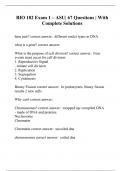Centrosomes - Study guides, Class notes & Summaries
Looking for the best study guides, study notes and summaries about Centrosomes? On this page you'll find 344 study documents about Centrosomes.
Page 4 out of 344 results
Sort by

-
BIO 182 Exam 1 – ASU| 67 Questions | With Complete Solutions
- Exam (elaborations) • 8 pages • 2023
-
Available in package deal
-
- $11.49
- + learn more
base pair? correct answer: different nuclei types in DNA what is a gene? correct answer: What is the purpose of cell division? correct answer: Four events must occur for cell division: 1. Reproductive Signal -initiate cell division 2. Replication 3. Segregation 4. Cytokinesis Binary Fission correct answer: In prokaryotes, binary fission results 2 new cells. Why can't correct answer: Chromosomes? correct answer: wrapped up/ compiled DNA - made of DNA and proteins. ...

-
BIOS 1300: Pre Lab 3 exam study guide questions and answers(latest update)
- Exam (elaborations) • 19 pages • 2024
- Available in package deal
-
- $14.49
- + learn more
What part of the cell contains the centrioles and the centrosomes? permuclear cytoplasm What is the function of the endocytic vesicle? moves large particles, fluid, or molecules What structure synthesizes protein for use inside cell? free ribosome The nuclear envelope has a phospholipid bilayer. True What structure regulates the passage of material between the cytoplasm and nucleus? nuclear pore What is the function of the nucleolus? ribosomal RNA synthes...
IUPUI Yard Anatomy Lecture Exam 1 Questions With 100% Correct Answers 2024

-
BIO 311C Comprehensive Exam 2 Questions Solved Correctly.
- Exam (elaborations) • 21 pages • 2024
-
Available in package deal
-
- $10.09
- + learn more
Prokaryotic Cell - Answer 1. No nucleus 2. DNA in the nucleoid region 3. No proteins are attached to DNA 4. No endomembrane system 5. No organelles 6. Cell size small (1-10 μm) Eukaryotic Cell - Answer 1. True nuclei 2. DNA within nucleus 3. Proteins (histones) are attached to DNA 4. Vast endomembrane system 5. Membrane-bound organelles such as mitochondria and chloroplasts 6. Larger cell size (10-100 μm) Prensent in animal cells only - Answer -Centrosomes w/ centriole...

-
TAMU Biology 111 final Exam Questions and Answers 100% Pass
- Exam (elaborations) • 12 pages • 2024
- Available in package deal
-
- $12.49
- + learn more
TAMU Biology 111 final Exam Questions and Answers 100% Pass Reasons why cells divide - Answer- -growth -cell and tissue repair -maintenance -reproduction When does DNA replication occur - Answer- before cell division Prokaryotes accomplish cell division through - Answer- binary fission + cytokinesis Eukaryotes accomplish cell division through - Answer- mitosis + cytokinesis Binary fission - Answer- asexual reproduction by separation of cell into new cells Steps for binary fission - Ans...

-
Mitosis steps in order latest update graded A
- Exam (elaborations) • 3 pages • 2023
-
- $8.49
- + learn more
Mitosis steps in order latest update graded A Prophase is the first stage. chromosomes condense and become visible. Spindle fibers emerge from the Centrosomes. nuclear envelope breaks down nucleolus disappears Prometaphase second stage of mitosis., chromosomes continue to condense kinetochores appear at the centromeres mitotic spindle microtubules attach to kinetochores centrosomes move toward opposite poles Metaphase third step in mitosis. mitotic spindle is fully developed, centrosomes are a...

-
Chapter 12: The Cell Cycle (Mitosis) Questions and Answers Graded A+
- Exam (elaborations) • 14 pages • 2024
- Available in package deal
-
- $9.99
- + learn more
Chapter 12: The Cell Cycle (Mitosis) Questions and Answers Graded A+ What are the three key roles of cell division? State each role and give an example Reproduction: an amoeba single celled eukaryote divides into two cells. Growth+Development: fertilized egg divides into two cells, beginning embryo formation. Tissue Renewal: dividing bone marrow will give rise to new blood cells What is meant by the cell cycle? the life of a cell from the time it's first formed from a dividing parent cell unt...

-
Rio Salado BIO 156 Exam 2
- Exam (elaborations) • 10 pages • 2024
-
Available in package deal
-
- $12.99
- + learn more
Cell Cycle - the collective series of intervals and events of a cells life, from the time it forms until it divides. What are the 4 intervals of interphase in the order they take place? - G1, G0, S, G2 What happens in interval G1? - this is when the cell increases in size and produces molecules required for DNA replication From which interval would a cell possibly go into interval G0 and how long would it stay there? What would it do there? - if a cell decided to go to G0 it would be af...

-
BSC 1010- Unit 2 exam review Brooks With 100% Verified Answers
- Exam (elaborations) • 24 pages • 2024
- Available in package deal
-
- $12.49
- + learn more
BSC 1010- Unit 2 exam review Brooks With 100% Verified Answers What does an animal cell have? (some things) - answerEukaryote HAVE: Centrioles Lysosomes Centrosomes Which ones of these includes flagella and cilia? A) Intermediate filament B) microtubules C) microfilaments - answermicrotubules What does cytology mean? - answerCyto- Cell ology- the study of / the study of cells What did Robert Hooke do? - answer- He is the scientist who made his own light microscope to look at sampl...

-
Bio 103 Exam 3 latest questions and answers all are correct graded A+
- Exam (elaborations) • 13 pages • 2024
- Available in package deal
-
- $7.99
- + learn more
Interphase - cell grows, performs its normal functions, and prepares for division; consists of G1, S, and G2 phases G1 phase - the cell grows in size and organelles double in size S phase - DNA replication ("S"= synthesize) G2 phase - cell growth, production of enzymes and other proteins two categories of mitosis - 1. karyokinesis (division of cell nucleus) 2. cytokinesis (division of cytoplasm) prophase - 1. chromatin condenses to form chromosomes; nuclear membrane and nucleoli disapp...

Study stress? For sellers on Stuvia, these are actually golden times. KA-CHING! Earn from your study resources too and start uploading now. Discover all about earning on Stuvia



